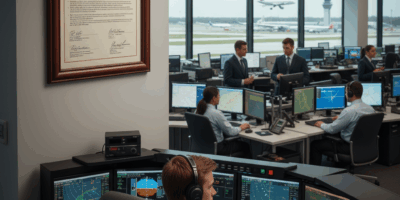Dispatcher Course
Understanding the Dispatcher Course
The role of a dispatcher is crucial in many industries. They ensure that operations run smoothly, whether it’s in transportation, emergency services, or logistics. A dispatcher course provides the training needed to excel in this field. You will learn how to handle various responsibilities, from coordinating schedules to responding to emergencies.
Foundations of Dispatch Training

The dispatcher course typically begins with an overview of the dispatching function. It covers the basics of communication, both verbal and written. You will understand the importance of clear, precise communication for effective coordination. You will also learn about the different types of dispatching, including emergency and non-emergency dispatching.
Communication Skills
Effective communication is critical for dispatchers. You will be trained to interact with people in high-stress situations. This includes active listening and the ability to convey information quickly and accurately. Courses emphasize the importance of staying calm under pressure. You’ll practice using various communication tools, such as radios, phones, and computer systems.
Technological Proficiency
Modern dispatching relies heavily on technology. You’ll gain proficiency in using dispatch software and systems. This includes learning how to input and retrieve information quickly. The course will teach you about GPS and mapping software, crucial for coordinating transportation and emergency responses. Understanding how to troubleshoot basic technical issues is also part of the training.
Emergency Response Protocols
For those entering emergency dispatching, understanding response protocols is vital. The course covers how to prioritize calls based on urgency. You’ll learn how to provide pre-arrival instructions and gather necessary information for responders. The training includes scenarios that require quick thinking and decisive action.
Legal and Ethical Considerations
Dispatchers must be aware of the legal and ethical implications of their job. The course includes information on confidentiality, proper documentation, and reporting requirements. Understanding these aspects is crucial for maintaining professional standards and ensuring compliance with regulations.
Coordination and Logistics
Logistics is a significant part of dispatching. You’ll learn how to coordinate schedules, manage routes, and ensure timely deliveries or responses. The course will cover strategies to optimize efficiency and reduce delays. You will also be trained in problem-solving techniques to handle unexpected issues effectively.
Stress Management Techniques
Dispatching can be a stressful job. Courses teach techniques for managing stress and preventing burnout. These include time management strategies, relaxation techniques, and understanding the importance of work-life balance. You’ll learn how to recognize signs of stress in yourself and others.
Customer Service Fundamentals
Good customer service is essential in dispatching. You will be trained to handle complaints and difficult situations professionally. This section of the course focuses on maintaining a positive attitude and providing helpful solutions. You’ll practice scenarios to improve your interpersonal skills.
Practical Training and Simulations
The course often includes practical training sessions. These simulations mimic real-life scenarios. You’ll practice dispatching calls, using communication systems, and responding to emergencies. These hands-on experiences are invaluable for building confidence and competence.
Certification and Continuing Education
Completing a dispatcher course often leads to certification. This credential can enhance your job prospects and professional credibility. Many courses also offer continuing education opportunities. Staying updated with the latest practices and technologies in dispatching is important.
Career Opportunities
A dispatcher course opens up various career opportunities. You could work in emergency services, transportation, logistics, or corporate dispatching roles. Each of these fields offers different challenges and rewards. Your training will prepare you to handle the specific demands of your chosen industry.
Enrollment Considerations
When choosing a dispatcher course, consider factors such as curriculum, instructors, and accreditation. Look for courses that offer a balance of theoretical knowledge and practical skills. Review feedback from former students to gauge the course’s effectiveness.
Dispatching is a dynamic and rewarding career. Proper training is essential to excel in this field. A dispatcher course provides the foundational skills and knowledge needed to succeed.



